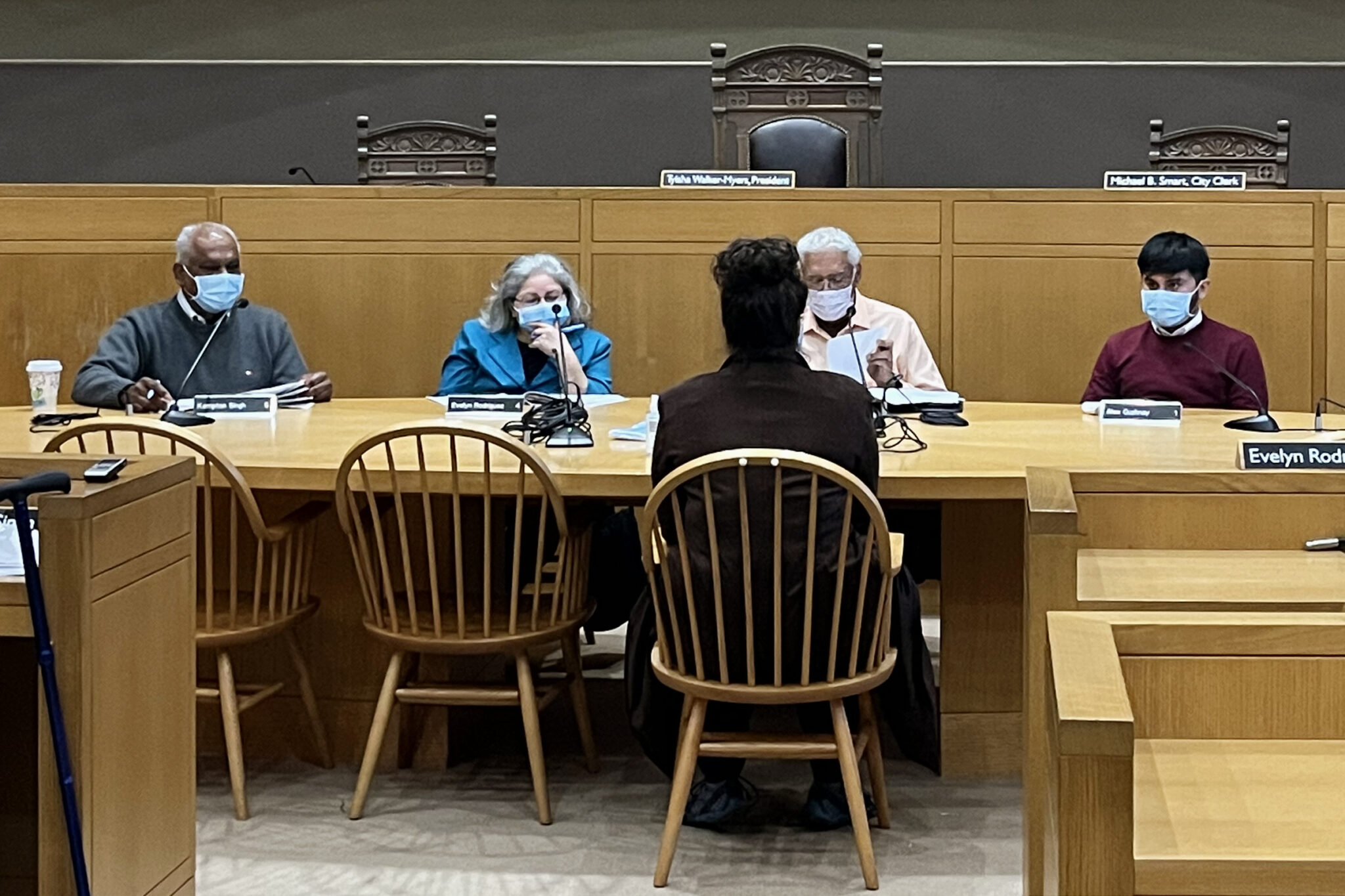Board of Alders reappoints two Board of Police Commissioners members for second term
During the Aldermanic Affairs Committee meeting, New Haven lawyers and professors Michael Lawlor and Tracey Meares were reappointed to the Board of Police Commissioners.

Mia Cortés Castro, Contributing Photographer
Last Monday, the Board of Alders approved the reappointment of two Board of Police Commissioners members, lawyers Michael Lawlor and Tracey Meares.
Lawlor and Meares, having each served three-year terms on the Board starting in late 2020, were eligible for reappointment this month. Through their careers in law, both commissioners have engaged with policing policy and criminal justice in New Haven.
At the meeting, Lawlor and Meares were among six candidates up for appointment or reappointment to various city-wide committees. Though both were being reappointed, Meares was required to come give testimony in-person and respond to alders’ questions due to a lack of attendance at Board of Police Commissioner meetings. All of her absences were excused by Chief Commissioner Evelise Ribeiro, as she said they were related to her greater work on the board. Of the 36 meetings over the past three years of Meares’s membership for which minutes are available online, Meares was present for 27 meetings.
During Monday’s meeting, Meares was interviewed by alders Gerald M. Antunes, Alex Guzhnay ’24, Evelyn Rodriguez and Kampton Singh. Lawlor, meanwhile, was not required to attend the reappointment meeting.
“New Haven has the opportunity to be a model of police service,” said Meares, who is also the Walton Hale Hamilton Professor of Law at Yale Law School and the founding director of the Justice Collaboratory. “My goal, and the Board’s goal in general, is to bring the policing that exists in New Haven today closer to this ideal of what policing can be. Through my work, I get to imagine and try to create a world in which this reality and this ideal get closer.”
While both Meares and Lawlor were recommended for appointment to the role in their first term, they had to seek reappointment for their upcoming second term. For Meares, it was New Haven Mayor Justin Elicker who first suggested she take on the position. Lawlor, however, recalled that one of his former students, former New Haven Police Chief Anthony Reyes, suggested he seek appointment for the role.
“It wasn’t originally my initiative but I’m happy to do it because I think if there was ever an important time for people who are properly motivated to get involved in trying to rebuild our police departments and regain the community’s trust, it’s now,” said Lawlor. “My whole career has been involved with criminal justice but never specifically policing, so this was a welcome opportunity that, together with commissioner Meares, we get to make a difference in New Haven.”
In addition to being a member of the Board of Police Commissioners, Lawlor is an associate professor at the University of New Haven’s Criminal Justice Department.
The Board of Police Commissioners is comprised of six members who serve three-year terms. Members are appointed by the mayor and then approved by the full Board of Alders. Within the first six months of their first term, Board of Police Commissioners members are expected to complete a series of trainings on city ordinances, policing procedure and structure and parliamentary procedures relevant to their roles.
The revised city charter defines the Board of Police Commissioners’ duty as to consult and advise the Chief of Police on all matters relating to their policing duties and the conduct of the New Haven Police Department. They must also collaborate with the police chief to determine rules and regulations to govern the administration of the NHPD.
Beyond their roles stated in the charter, Lawlor mentioned that the most difficult part of the Board of Police Commissioners’ job is having to decide what form of disciplinary action is most appropriate when the conduct of a member of the police force requires measures beyond a ten-day suspension. If their discipline deserves anything less than a 10-day suspension, the police chief interferes instead.
“Like commissioner Meares, I’m a lawyer,” said Lawlor. “We used to be prosecutors at one point and are very familiar with the law. I was in the legislature for a long time and am very involved in policy. I’m also on the statewide police officer training council, so we set the model policies for the entire state. It’s a very important time for people to get involved and try and help fix things, so I’m happy to do it.”
With another three years of membership on the Board of Police Commissioners, Lawlor and Meares said they are looking to continue developing a relationship with the community through their work to improve New Haven policing.
In her responses to the alders, Meares — who is actively involved in legislative and community-based roles around the city — said she finds her work to be “very important.” She stated her appreciation of the spirit of collaboration and diverse perspectives among the members of the board.
Alders Antunes, Guzhnay, Rodriguez and Singh unanimously voted yes on her reappointment, expressing appreciation for her prioritization of the greater New Haven community and her broad, accepting perspective. Though they deliberated over whether or not Meares would have sufficient time to dedicate to the Board of Police Commissioners due to her outside commitments and job, they ultimately deemed her once again fit for the position.
“I think she’s an asset to the Commission,” said Singh, who is the Ward 5 alder. “With her experience, looking at her resume, with her legal background, she can make a contribution to this commission. I’m sure that her colleagues think she’s great to work with and adds insight to the Commission with her legal background. She’s a good fit for the Board of Police Commissioners.”
Lawlor and Meares’ first terms expired on Feb. 1, 2023.







